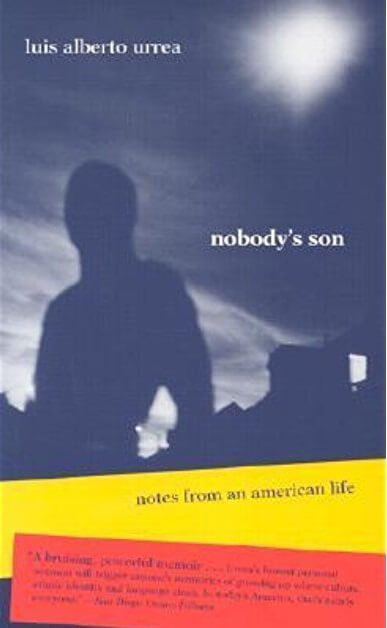15 Feb / Nobody’s Son: Notes from an American Life by Luis Alberto Urrea

 This third and final installment of Luis Alberto Urrea‘s Border Trilogy is unmistakably his most personal. His “good Republican” mother from Staten Island never accepted his Mexican identity. His “devil on the dance floor”-father was once on Mexico’s presidential staff, becoming a bowling alley janitor when he crossed the border; he was his son’s “hero and [his] greatest source of terror.”
This third and final installment of Luis Alberto Urrea‘s Border Trilogy is unmistakably his most personal. His “good Republican” mother from Staten Island never accepted his Mexican identity. His “devil on the dance floor”-father was once on Mexico’s presidential staff, becoming a bowling alley janitor when he crossed the border; he was his son’s “hero and [his] greatest source of terror.”
His parents’ marriage eventually devolved into a “long chess game of hate,” with their only child stuck somewhere in between. He was not Mexican (“whatever Mexican is”) with his blond hair and blue eyes inherited from his immigrant father: “our Aryan looks are attributed to the Visigoths, when they entered Spain and generously dispersed gallons of genetic material in every burning village.” And in spite of his U.S. citizenship, with a name like Luis Alberto Urrea, he certainly could not be considered American.
As he examines the many permutations of his global heritage – Native American, various types of European, even Chinese – Urrea draws parallels to the amalgam that is the English language. Every chance he gets, he points out (with etymological roots glibly noted in parentheses) that the “official language of the United States” is hardly untainted: “Thank God so many people lent us [their words] or we’d be forced to point and grunt.”
With his blended background and his borrowed, adapted, stolen language, “America is home. It’s the only home I have. Both Americas. All three Americas, from the Arctic circle to Tierra del Fuego.” Borders criss-cross his experience, yet Urrea remains fluid, refusing to succumb to “a nightmare of silence.” He shares his love of words openly, freely, hopefully and reveals glimpses of his family’s Tijuana tales, his southern California childhood trapped between his warring parents, and the temporary sanctuary he found in the home of an older couple who loved him most tenderly. He adds memories of whores and nuns, of a red Cadillac with literary history, and a Jeep with too many miles left to go.
“I’m not old enough to write my memoir,” Urrea insists. Instead, “I’ve offered here a few words about my part of the journey.” Still very much in his youth, he confesses, “I don’t know where I’m going.” No matter … empowered by his stories – soothing and disturbing, damning and enlightening – we readers are sure to follow along for the memorable literary ride.
Readers: Adult
Published: 1998
